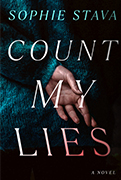
 |
The Lobotomist's Wife |
by Samantha Greene Woodruff |
 |
Discussion Questions |
1. THE LOBOTOMIST'S WIFE is inspired by the real story of a doctor whose passion turns to deadly obsession. Can you think of other moments in history in the same vein? How often do science and medicine cross the line of ethics and morality in the name of progress? 2. The novel explores how ego can distort best intentions into horrifying results, with broad-reaching consequences. Do you believe Robert did indeed have the best intentions? Can you pinpoint a scene or series of scenes in the book where his character began to deviate from the initial plan? 3. The book takes place between the 1930s-50s in New York at a time when the medical community endorsed lobotomy as a "miracle cure." By the early 1940s, it was in broad use for extreme psychosis. How does the author convey mental health treatment in the era, and does it help explain why lobotomy was embraced by the medical community? Do you have a sense of whether the author remained true to the events and social structures of the time period? 4. Throughout the beginning of this novel, lobotomy is depicted as an innovative and revolutionary solution to what was believed as insanity. Compare and contrast this depiction of lobotomy to other titles that also reference it, such as The One Who Flew Over the Cuckoo's Nest. 5. Is this a time period you knew a lot about before you read this book? If so, did you learn anything new? If not, did you come away with a greater understanding of what this particular time and place in history, especially for women, was actually like? 6. Ruth mourns her beloved brother, Harry and his suicide played a significant role decision to devote her life to caring for the mentally ill. Do you think Ruth is trying to compensate for not being able to save her brother? 7. Ruth falls for the brash and innovative neurologist Robert and his perceived compassion for his patients. Is she too readily accepting of his self-proclaimed cure for insanity and radical new treatment? 8. How did the blended genre of historical fiction and suspense/ thriller impact your reading experience? Did you have a sense of foreboding because of the knowledge we have today of the harmfulness of lobotomy? 9. Ruth is torn between her role as supportive wife and caretaker and administrator of the hospital. Both identities are at war throughout this book. When was the turning point for Ruth to accept that her role as a supportive wife shouldn't be the reason her patients are mistreated? Do you think it should have happened sooner? 10. The novel keenly depicts postpartum depression in the character Margaret Baxter. As a young housewife humiliated by her inability to be a "proper" wife and mother, she's desperate for a cure for her "baby blues." Describe how mental illness awareness has changed over the course of time and how it hasn't. 11. Margaret believes lobotomy will "fix" her. Does this desire to find a quick fix for the woes of being a housewife and mother have any parallels in today's world? 12. Ruth and Margaret are both strong female characters who were held to a specific standard of their time. How did these standards impact their journeys? In what ways are they victims of society's standards of typical loving, supportive wives? 13. Ruth blames herself for Robert harming her patients, and others, do you believe she could have done something different to deter him from acting so recklessly, or was he predetermined to be on this path? 14. The story is told in the close third person from Ruth and Margaret's perspectives. How does this affect the story and how might it have been different if another character was telling the story? Discussion Questions by the Publisher Book Club Talking Points:
The novel provides a fascinating glimpse into a dark chapter of medical history, encouraging discussions about ethics, mental health, and the role of women in society. It also delves into thought-provoking themes such as truth, memory, and the blurred lines between sanity and madness, great material for discussion. |

|
More Reading Suggestions |
|
If you have a passion for reading and, like most, have no time to find the right book, browse Trending & Popular Books. They are all page-turners, and they all let you escape from reality. |
 Buckeye By Patrick Ryan
Book Summary: Patrick Ryan's Buckeye is a sweeping, decades-long narrative about two families in a small Ohio town. You spend the most time with two couples: Cal and Becky, and Felix and Margaret. ... More
|
 Culpability by Bruce Holsinger
Book Summary: Set at a summer rental on the Chesapeake Bay, a riveting family drama about moral responsibility in the age of artificial intelligence, from the bestselling author of the "wise and addictive" (New York Times) The Gifted School ...More
|
 Count My Lies by Sophie Stava
Harmless lies, mostly, to make her self-proclaimed sad, little life a bit more interesting. So when Sloane sees a young girl in tears at a park one afternoon, she can't help herself-she tells...More
 Starling House by Alix E. Harrow
NEW YORK TIMES BESTSELLER | A REESE'S BOOK CLUB PICK. Starling House is a gorgeous, modern gothic fantasy from the New York Times bestselling author of The Ten Thousand Doors of January.....More
|
 Isola by Allegra Goodman
A young woman and her lover are marooned on an island in this "lushly painted" (People) historical epic of love, faith, and defiance from the bestselling author of Sam....More
|
 The Dream Hotel By Laila Lalami
READ WITH JENNA BOOK CLUB PICK AS FEATURED ON TODAY - From Laila Lalami-the Pulitzer Prize and National Book Award finalist and a "maestra of literary fiction" (NPR)-comes a riveting ...More
|
Visit Our Blog |
You May Also Like |
 |






